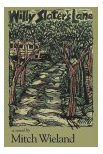|
Contents » Cover
» Art |
||
|
Reviews
Take one part miserable redneck repertoire a la Larry Brown and one part of Raymond Carver's quiet wisdom and craft, and what you're left with is Mitch Wieland and his beautifully painful debut, Willy Slater's Lane. This is a character driven novel that stands alone in comparison to contemporary literature. It's fresh and original without being part of the generation-next-just-do-it fad, and it's completely primal and accessible without being of the Docker-dad/soccer-mom brand of fiction. Although Wieland is fresh from the MFA program at the University of Alabama (this book being his thesis), Willy Slater's Lane leaves the taste in one's mouth of a true veteran. Eerily precise are his sentences, his syntax simple and clean. Yet even at a skimpy 161 pages, Wieland's skillful storytelling helps him achieve what few can in a book double the length. "Harlan and Erban were eating breakfast in the kitchen when their living room collapsed." So begins this stoic, albeit sensitive, tromp through the stagnant, poverty-enriched terrain of the Ohio backlands. Said men are will-less and jobless aging brothers—reminiscent of a soured Laurel and Hardy at the end of their rope—living in a rotting clapboard house on the land bequeathed to them by their father, who noosed himself from the rafters of the barn before the onset of the story. Harlan is the eldest, an overbearing pessimist who holds a distrust for the world and a stiff upper hand over Elizabeth, his obese mail-order bride, and the meek, innocent and bookish Erban (he owns an old set of encyclopedias he reads cover to cover). They have almost no money to speak of (Harlan bitches at Elizabeth for being a wastrel and making their morning coffee too strong). Neither brother has ever held a job, and Harlan intends to live out the rest of his life just so. And as long as Erban has Harlan, Elizabeth and his encyclopedias, he intends to live out his days on his father's land learning about the world from his out-dated books. But, as the land surrounding their home is being eaten up by a hungry coal company, the relationship between the three fizzles. Elizabeth becomes deathly ill, and because Harlan won't take care of her because he believes she's faking, Erban brings her back from near death, which leads to a mutual bonding between the two, and a no-no. In the barn Erban rolls in the proverbial hay with Elizabeth, only to be caught by Harlan. Their family, their land and their home all crumble to pieces. Then Elizabeth runs away. Harlan now not speaking to Erban, the two are forced to relocate into an old school bus because their home finally collapses totally. But as rigid as Harlan seems, there's a soft side to him, full of regret for the way he treats people. But that regret cannot save his life as his truck careens off a bridge and into a murky river. It seems Erban will live out his last days alone, but with the help of a neighbor and his willing heart, Erban finds in life something he never expected. With a mix of wry humor and a tight heart, Willy Slater's Lane marks Mitch Wieland's powerful, inaugural emergence as a writer to be watched.
|
|||||
